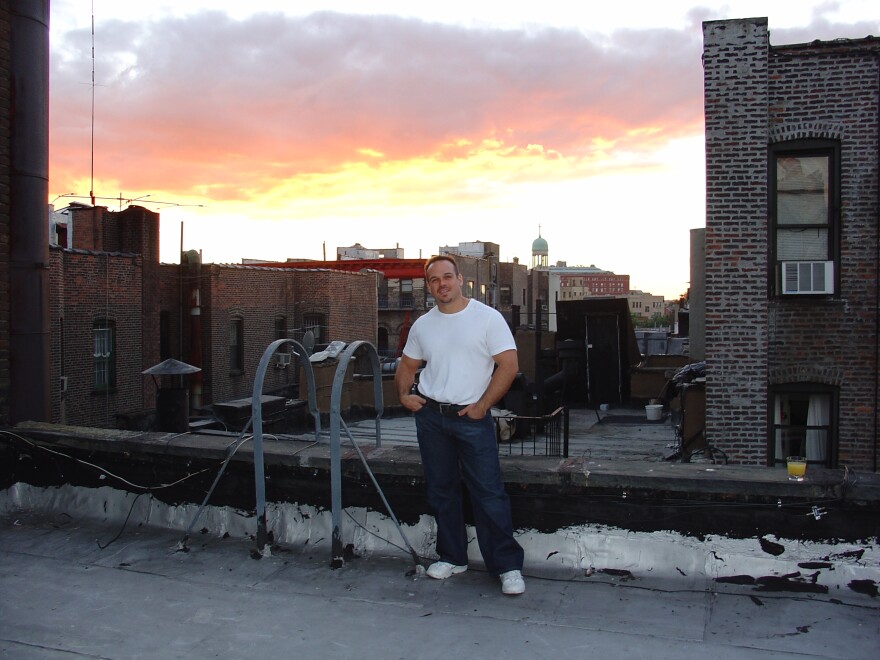[Editor’s note: we highly recommend listening to this story]
As a kid growing up in New York, Jason Nicholas knew blacktop and police sirens better than rivers and streams.
Nicholas was often out on the neighborhood streets with friends, despite the crime and violence of the 1970s. “Everyone did it,” he said. “It wasn't like we were special.”
But each summer, the scene changed, when Nicholas was delivered to his grandmother’s home in Maine for some fresh air. Nicholas, who goes by “JB,” has his origin fish story from one of those trips.
“It was a blue fish. I caught a couple of them, and you know, for a 7-year old kid from the Bronx, catching a fish was, like, it was a whole new world,” he said.
Fishing would become a passion, his world outside of the city. But it wouldn’t save him.
“I was lucky. I got to — before it all went a little crazy — I got to cast a line in those rivers and get a good taste of the outdoor life,” he said.
“A little crazy”: That’s how Nicholas refers to another turning point in his life. In 1990 a teenage Nicholas pulled the trigger of a shotgun, shooting a stranger who he thought may be trying to rob him.
Nicholas served more than a dozen years in prison on a manslaughter conviction, but he’s still struggling to step out of the shadow of that night in one particular way: In 2023, Nicholas applied to be a fishing guide in New Hampshire. He wanted to carry out a dream of leading backcountry expeditions and spend what he calls the second half of his life reconnecting with his childhood summers in the outdoors. But decades-old state rules prohibiting felons from obtaining guide licenses stood in the way.

“Here I am, 30-something years later, done all this great stuff, helped a lot of people besides myself and, you know, and I'm just a felon,” he said.
So Nicholas took what he learned filing legal motions for himself and other inmates from inside prison walls, and crafted a new lawsuit: this time, against the State of New Hampshire over its fishing guide policies. Nicholas prevailed, which means when state officials gather next week to consider rewriting formal regulations on fishing guide qualification, he could be one step closer to his dream of leading backcountry fishing tours — and sharing his love of the outdoors with others.
A shot at redemption
After reading some of Nicholas’s court filings, I wanted to meet him in person and tag along on a fishing trip. We were supposed to connect at 11 a.m. at a campground alongside the Androscoggin River in Errol, near the New Hampshire-Maine border.
He was late, though, stranded by a dead car battery in a Walmart parking lot 40 minutes away. Eventually, he made his way streamside, and just before he turned in to meet me, one of his favorite bands — Dropkick Murphys — came on the radio.
He took it as a good sign.
“So it's just like: Yes! Things are turning a corner,” he says, a huge smile revealing his David Letterman gap tooth. “It's going to be good the rest of the day. Anyway, this is my vacation. This is how New Yorkers do it.”
Nicholas, now 55, says those summers in Brooksville, Maine at his grandmother’s house gave him a love of the outdoors. He remembers the first time he saw someone fly fishing, their arms moving in a practiced arc, belly-deep in the water.
“It's almost like learning some kind of magic, you know," he said. "It's this esoteric knowledge.”
He would fish rivers in the Catskills in upstate New York during camping trips with his mother. It was a break from the challenges of growing up in a city struggling with a crack epidemic and gun violence.
“It's just difficult for people to wrap their heads around how crazy New York was in the late 1980s and early 1990s,” he said.
Soon, though, Nicholas would find himself caught up in the swirl.

On March 3, 1990, Nicholas, then 19, and three friends picked up some beer, then stopped to relieve themselves in Mount Vernon, just north of New York City. In Nicholas’s telling, a man suddenly appeared on the sidewalk, walking towards him. He believed the guy was carrying a gun. Nicholas hustled to the car, grabbed a shotgun, and fired three shots.
According to Nicholas, he didn’t think he'd hit the man, who ran off.
He would read about what happened in the paper: that a 26-year old named Paul DeLano was dead, and that DeLano’s father wanted answers.
Prosecutors would allege that Nicholas killed DeLano in cold blood, unprovoked. A jury convicted Nicholas of second-degree manslaughter. He would serve nearly 13 years in prison.
When he was released, he vowed to reform himself. He completed a bachelor’s degree from New York University in creative writing, and then went to work as a news photographer for the New York Post. He did a little paparazzi work, and then in more recent years, made a name for himself as a freelance journalist writing about prisons, corrections and inmate abuse for his own website.
He’s tenacious about journalism. Really, about everything he does.
“I go to the fish. I bring it to the fish,” he told me while wiggling into a pair of patched waders. “I don’t wait for the fish to bring it to me.”
In the water, which is running high this day, Nicholas casts a nymph, avoiding low hanging branches. He was in this same river, a few years ago, when he decided it was time for a career change.
“I turned 50 the same year the pandemic hit, and I just realized: I got another life in me to live, you know? And I wanted to live it outside,” he said.
Nicholas’s plan was to start a fishing guide service: take people backcountry, teach them to fish the wild rivers of upstate New York, where he now lives, along with New Hampshire and Maine, the places he knows best.
But when he went to apply for the license, he would hit that decades-old snag: those three states prohibit felons from getting guide licenses.
“It's not just hurtful,” said Nicholas. “It makes me angry.”
Removing the felon box
According to New Hampshire Fish and Game officials, state rules prohibiting people with felony records from obtaining hunting or fishing guide licenses have been on the books since the late 1960s or early 1970s.
"We have a duty, I think, to make sure that we're not putting kids and families out with someone who is not safe,” said Colonel Kevin Jordan, who leads the agency’s law enforcement efforts.
When Nicholas learned of the prohibition, he said he spoke with agency officials who explained the policies but said there was little to be done.
So in 2023, Nicholas sued New Hampshire Fish and Game, alleging that the blanket ban was a violation of his constitutional rights. The state moved to dismiss the case, but last year, a federal judge issued a preliminary ruling siding with Nicholas, who represented himself. New Hampshire then agreed to work with Nicholas to craft new regulations, avoiding a trial.
Jordan said that he has his trepidations about changing the standard, but that he understands why the old policies no longer make sense.

“The felony conviction was the standard back in the old days to say, 'well, they're not safe because they were convicted of a felony,' ” said Jordan. “That still may be the case, depending on the felony and the rehabilitation. But I'm not ready to say that's everyone.”
Under the new proposed rules for fishing guides, there must be at least 10 years between a person’s felony conviction and their application for a license. Applicants with felony records will have to prove to a committee that they’ve rehabilitated themselves. Then, they’ll still have to take the guide test, which Jordan says is highly technical.
“JB's an intense individual,” said Jordan.” I can't talk about what he did, but I can tell you he's, in my opinion, if what he's telling me is true, he's worked pretty hard to clean his record up.”
There is a public hearing on the new proposals scheduled for September 11 at 6 p.m. at Fish and Game headquarters in Concord. A legislative committee will then need to sign off. If the process goes smoothly, Nicholas could sit for the guide exam, perhaps early next year.
“That's a big victory, I feel,” he said. “And I'm glad to be able to share that with the people in New Hampshire.”
Nicholas also prevailed in his lawsuit against New York, but lost his case in Maine. He’s appealing that ruling. He wants these guide licenses for his fledgling backcountry guide business, but he also sees the legal challenges as a way to chip away at the variety of regulations that have long stood in the way of felons getting certain jobs, housing, and opportunities.
“I was convicted of manslaughter, so in a way, my debt never ends,” he said. “I have a duty not only to better myself so that I never commit another crime, but to also help others better themselves so that they don't commit a crime or another crime.”
‘The love of this’
Back in the waters of the Androscoggin, Nicholas is still casting lines. He fishes with a GoPro camera affixed to his chest.
“In case I land something big,” he jokes. Technology makes fish tales a thing of the past: Pics or it didn’t happen.
This stretch of the river is home to some large brook trout. He knows people who have pulled 16-inch fish from the water. But with the river running high and fast following a storm, conditions aren’t ideal today. Nicholas ties on different nymphs, walks long stretches of the river bank, but hours go by without any action.
Until he feels a slight tug. “It's a very small fish, but I got one. Look at that,” he said, showing off a juvenile brook trout squirming in his net.
He unhooks it, lowers it into the river, the first day of his fishing vacation officially a success.
“I just want to share this with people,” he said. “The love of this.”









